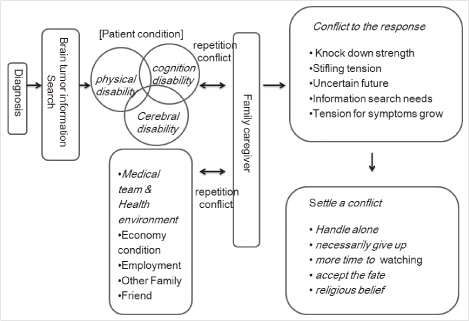Asian Oncol Nurs.
2012 Jun;12(2):186-193. 10.5388/aon.2012.12.2.186.
Caring for Dying Patient with Glioblastoma Multiforme: A Narrative Analysis of the Caring Experience of Family Caregiver
- Affiliations
-
- 1Department of Public Health, Graduate School of Social Development, Chung-Ang University, Seoul, Korea.
- 2College of Nursing, Chung-Ang University, Seoul, Korea. go2ryu@cau.ac.kr
- 3Department of Preventive Medicine, Chung-Ang University College of Medicine, Seoul, Korea.
- KMID: 2269525
- DOI: http://doi.org/10.5388/aon.2012.12.2.186
Abstract
- PURPOSE
The purpose of this narrative study was to understand how family caregivers interpreted themselves life during caring for dying patients with gliobalstoma, and how they integrated these experiences into their personal biographies.
METHODS
Three family caregivers were recruited for the study. Data were collected through a series of audio-taped unstructured interviews and conversations with participants. The interviews and observation were conducted between October and November, 2011. Data were analyzed using psychosocial analytical methods that combined case based, in-depth staged analysis of narratives.
RESULTS
The life experiences of the family caregivers with a dying family member were summarized as, in their own voices, 'the repetition of gliobalstoma', 'a smart patient', 'being obsessed with rehabilitation treatment', 'the frustration from nothing but just looking at the suffering of the patient', and 'a stubborn son'.
CONCLUSION
Caregiving was characterised by various roles and life changes from the moment of diagnosis. Family caregivers of brain tumor reported experiences similar to those described by caregivers of people with other cancers. What differed for this group was the rapidity of change and the need for immediate information and support to assist with caring for a person with high-grade glioma.
MeSH Terms
Figure
Cited by 1 articles
-
Experiences of Distress among Family Caregivers of Hospitalized Cancer Patients
Juhye Jin, Jin-Hee Yoo
Korean J Adult Nurs. 2017;29(5):451-462. doi: 10.7475/kjan.2017.29.5.451.
Reference
-
1. National cancer center. Annual report of cancer statistics in Korea. accessed on 11 November 2011. Available at: http://www.ncc.re.kr/manage/manage03_033_view.jsp.2. Cerebrospinal fluid tumor clinic. Brain tumor 100Q 100A. 2009. 2nd ed. Gyunggi-do: National Cancer Center.3. Schmer C, Ward-Smith P, Latham S, Salacz M. When a family member has a malignant brain tumor. J Neurosci Nurs. 2008. 40(2):78–84.
Article4. Park YH, Yu SJ, Song MS. Caregiver burden of families with stroke patidents and their needs for support group intervention. J Korean Acad Adult Nurs. 1999. 11:119–134.5. Nijboer C, Tempelaar R, Sanderman R, Triemstre M, Spruijt RJ, Geertrudis AM, et al. Cancer and caregiving: The impact on the caregiver's health. Psychooncology. 1998. 7:3–13.
Article6. Chien LY, Lo LH, Chen CJ, Chen YC, Chiang CC, Yu Chao YM. Quality of life among primary caregivers of taiwanese children with brain tumor. Cancer Nurs. 2003. 26:305–311.
Article7. Sales E. Family burden and quality of life. Qual Life Res. 2003. 12:33–41.8. Cho HS, Jeong SU, Kim JS, Gwon JS. Qualitative inquiry and research design: choosing among five approaches. 2010. Gyunggi-do: Hakjisa.9. Clandinin DJ, Connelly FM. Narrative inquiry: Experience and story in qualitative research. 2000. San Francisco: Jossey-Bass.10. Lincoln YS, Guba EG. Naturalistic inquiry. 1985. Beverly Hills, CA: Sage.11. Riessman CK. Narrative analysis. Qualitative research methods series, No. 30. 1993. Newbury Park, CA: Sage.12. Curren JR. Support needs of brain tumour patients and their carers: the place of a telephone service. Int J Palliat Nurs. 2001. 7:331–337.
Article13. Arber A, Faithfull S, Plaskota M, Lucas C, de Vries K. A study of patients with a primary malignant brain tumour and their carers: symptoms and access to services. Int J Palliat Nurs. 2010. 16:24–30.
Article14. Janda M, Steginga S, Dunn J, Langbecker D, Walker D, Eakin E. Unmet supportive care needs and interest in services among patients with a brain tumour and their cares. Patient Educ Couns. 2008. 71:251–258.
Article15. Centre for health promotion. University of toronto. The quality of life model-conceptual framework. 1991. accessed on 15 Oct 2011. Available at: http://www.utoronto.ca/qol/concepts.htm.16. Schubart JR, Kinzie MB, Farace E. Caring for the brain tumor patient: family caregiver burden and unmet needs. Neuro Oncol. 2008. 10:61–72.
Article17. Sohn SK. Needs of hospice care in families of the hospitalized terminal patients with cancer. J Korean Oncol Nurs. 2009. 9:1–6.
- Full Text Links
- Actions
-
Cited
- CITED
-
- Close
- Share
- Similar articles
-
- A Philosophical Inquiry into Caring in Nursing: Based on Ricoeur's Narrative Ethics
- Neonatal Intensive Care Unit Nurses' Experience in Caring for Infants Who Are Dying
- The Experiences of Family Caregiving in a Chronic Care Unit
- Nurses' Experience of Caring for Dying Patients in Hospitals
- Experiences of Critical Care Nurses Caring for Dying Patients


